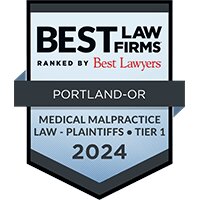Best Toxic Mold Lawyers in Oregon
Share your needs with us, get contacted by law firms.
Free. Takes 2 min.
Or refine your search by selecting a city:
List of the best lawyers in Oregon, United States
About Toxic Mold Law in Oregon, United States
Toxic mold refers to certain types of mold that can produce harmful toxins, potentially causing serious health problems for people exposed to them. In Oregon, toxic mold issues commonly arise in residential and commercial properties due to the state's damp climate. Mold exposure can cause respiratory issues, allergic reactions, skin problems, and more severe health complications for vulnerable individuals. The legal field of toxic mold addresses the responsibilities of property owners, landlords, tenants, and others when mold contamination occurs, as well as the rights of those affected to seek remedies.
Why You May Need a Lawyer
There are several situations where individuals may require legal assistance concerning toxic mold in Oregon:
- You are a tenant who has discovered mold in your rented home and your landlord refuses to address the concern despite repeated requests.
- You are a homeowner facing costly repairs for mold damage and suspect a builder, contractor, or previous owner concealed or caused the problem.
- You have suffered health problems and believe they are linked to mold exposure in your residence, workplace, or school.
- You are involved in a real estate transaction and worry about disclosure obligations regarding known mold presence.
- You are a landlord or property manager needing guidance on your legal responsibilities for preventing or addressing mold issues in rental units.
Legal advice can help you navigate complex liability issues, negotiate settlements, pursue compensation, and ensure compliance with state and local regulations.
Local Laws Overview
In Oregon, several statutes and regulations can be relevant to toxic mold cases:
- Landlord-Tenant Law: Oregon Revised Statutes (ORS) Chapter 90 governs rental relationships. Landlords must provide safe and habitable housing, which includes addressing mold issues that could affect health or habitability. Tenants may be entitled to repairs or rent reductions if landlords do not meet these obligations.
- Disclosure Laws: Sellers of residential real estate in Oregon are required under law to disclose known material defects, which may include mold problems, before finalizing a sale.
- Building Codes: State and local building codes require construction and maintenance practices that help prevent water intrusion and mold growth.
- Health and Safety Regulations: Public health authorities may intervene in cases involving mold that threatens community health, such as outbreaks in schools or public buildings.
While Oregon does not have specific stand-alone statutory provisions exclusively about toxic mold, general health, safety, landlord-tenant, and real estate disclosure laws often apply.
Frequently Asked Questions
What is considered toxic mold in Oregon?
Toxic mold commonly refers to species such as Stachybotrys chartarum, but other molds can also become harmful depending on individual sensitivities. Mold becomes legally relevant when it affects health or property.
What are my rights as a tenant if I find mold in my rental?
Tenants have the right to live in a habitable unit. If mold makes your rental unsafe, you should notify your landlord in writing. Your landlord is generally required to address habitability issues, including significant mold problems.
Can I hold my landlord responsible for health problems caused by mold?
If your landlord failed to maintain a habitable property or delayed in addressing known moisture or mold issues leading to your health problems, you may have grounds for a claim. However, proving a direct link between the mold and your illness is essential.
How quickly does a landlord need to respond to mold complaints?
Oregon law requires landlords to make necessary repairs within a reasonable timeframe, especially if the issue affects habitability. The exact timeline depends on the severity of the issue and its impact on living conditions.
Does Oregon require mold disclosure during property sales?
Yes, sellers of residential properties must disclose known material defects, which can include mold or prior water damage that could result in mold.
Should I hire a mold inspector or remediation company?
It is often wise to hire certified professionals to assess and remediate mold, as this provides important documentation if you later need to pursue a legal claim.
Can my employer be liable for mold exposure at work?
Employers have a duty to provide a safe workplace. If mold exposure occurs due to employer negligence, affected employees may have claims under workers' compensation laws or other regulations.
What compensation can I seek for toxic mold exposure?
You may be entitled to compensation for property damage, medical expenses, lost wages, alternative accommodations, or pain and suffering if you can prove liability.
Are there time limits for filing mold-related claims?
Yes, Oregon has statutes of limitations for property and personal injury claims. If you delay, you may lose your right to sue. Speaking with a lawyer promptly is important.
What should I do first if I discover mold?
Notify your landlord, property manager, employer, or relevant authority in writing. Document the mold with photos and keep records of all communications and reports. Consult a legal professional for advice on your specific situation.
Additional Resources
If you need more information or assistance concerning toxic mold, consider these resources:
- Oregon State Bar - Information and referrals for legal questions related to housing and mold.
- Oregon Health Authority - Guidance and fact sheets on mold in homes and buildings.
- Local County Health Departments - Assistance with public health concerns, including mold in rental properties.
- Oregon Department of Justice, Consumer Protection - Support for renters and homebuyers regarding housing issues.
- U.S. Environmental Protection Agency (EPA) - National guidance on indoor air quality and mold, relevant to all states.
Next Steps
If you believe you have a toxic mold issue requiring legal advice in Oregon, take the following steps:
- Document all evidence of mold, including photographs, medical records, and any communications with involved parties.
- Contact the responsible party in writing - this may be your landlord, employer, or seller.
- Consult a legal professional experienced in toxic mold or property law to evaluate your case and explain your options.
- If immediate health or safety is at risk, reach out to your county health department or housing authority.
- Act promptly, as waiting may affect your legal rights and potential remedies.
An experienced Oregon toxic mold lawyer can help you understand your rights, build your case, and seek appropriate remedies or compensation.
Lawzana helps you find the best lawyers and law firms in Oregon through a curated and pre-screened list of qualified legal professionals. Our platform offers rankings and detailed profiles of attorneys and law firms, allowing you to compare based on practice areas, including Toxic Mold, experience, and client feedback.
Each profile includes a description of the firm's areas of practice, client reviews, team members and partners, year of establishment, spoken languages, office locations, contact information, social media presence, and any published articles or resources. Most firms on our platform speak English and are experienced in both local and international legal matters.
Get a quote from top-rated law firms in Oregon, United States — quickly, securely, and without unnecessary hassle.
Disclaimer:
The information provided on this page is for general informational purposes only and does not constitute legal advice. While we strive to ensure the accuracy and relevance of the content, legal information may change over time, and interpretations of the law can vary. You should always consult with a qualified legal professional for advice specific to your situation.
We disclaim all liability for actions taken or not taken based on the content of this page. If you believe any information is incorrect or outdated, please contact us, and we will review and update it where appropriate.
Browse toxic mold law firms by city in Oregon
Refine your search by selecting a city.










